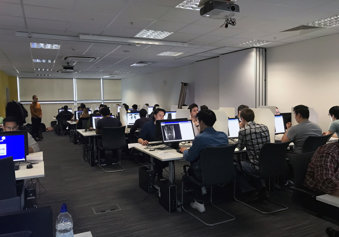FRCR Part 2A (Oncology) - CO2A - guidance notes for candidates
LEARN MORE1 Exam Structure
The Final FRCR (Part A) exam comprises two papers of single best answer (SBA) questions. The exam is held twice a year: normally in February and August/September. Candidates are given three hours to answer questions within each session.
2 Attempts
No candidate will automatically be permitted more than six attempts at any FRCR exam. In order to attempt an exam for a seventh, or further time, candidates will have to demonstrate additional educational experience.
3 Content
Each of the two sessions comprises questions on a wide range of areas of practice across the curriculum. The content of each session is listed below:
| Session 1 | |
|---|---|
| Tumour type | Number of questions |
| Respiratory | 24 |
| Urology | 24 |
| Head and Neck |
24 |
| Skin | 12 |
| CNS | 12 |
| Gynaecology | 24 |
| Session 2 | |
|---|---|
| Tumour type | Number of questions |
| Breast | 24 |
| Lower Gastrointestinal | 24 |
| Upper Gastrointestinal |
12 |
| Haematology | 12 |
| Miscellaneous | 36 |
| Radiology and Imaging | 12 |
For further information, the miscellaneous section will contain questions on paediatrics, thyroid, sarcoma, acute oncology and Carcinoma of Unknown Primary, pharmacology, radiotherapy regulations, and small number of questions that do not specifically fit into a defined site-specific category.
Each SBA question comprises a stem (a question or a statement) and five items (answers). Candidates are asked to decide which one of the five items represents the best answer to the question given in the stem.
4 Standard Setting
A ‘modified’ Angoff method is used to set the pass mark or standard for this exam. This involves a panel of subject matter experts (examiners) evaluating each question and providing an estimate as to how likely the just-passing candidate would know the answer.
Each item is scored on the basis of the percentage of ‘just passing’ candidates who should know the correct answer. These scores are collated and presented at the standard setting meeting. After discussion, the standard setters again score the questions, the highest and lowest scorers are removed, and the mean of the remaining post-discussion scores is used to set the standard.
The final pass mark is determined after the exam using the Hofstee compromise method. This takes account of candidate performance in the exam alongside judgements made by standard setters. The candidate cohort and pass rates will vary from sitting to sitting.
5 Marking
The exam is marked by the exam software Speedwell and the marking system shown below is used:
- For each item correctly answered +1 mark
- For each item incorrectly answered 0 marks
The exam is not negatively marked and therefore candidates are encouraged to offer an answer to all of the questions.
6 Quality Assurance
After each sitting, and prior to results publication, a group of expert examiners conduct a statistical review of the question paper performance and quality control checks to make sure all the questions and answers are fair. This analysis allows the RCR to ensure that the exam is reaching optimal levels of reliability and fairness. Poorly performed questions are scrutinised and are removed if error or ambiguity is found. If any questions are removed from the exam, then the pass mark is adjusted accordingly. Candidates will not be disadvantaged where this occurs. All exam results are checked by RCR staff before being published to candidates.
7 Equipment Required for the Exam
Candidates are required to bring writing implements, should they wish to use any scrap paper. Calculators are not required for this exam. Candidates are provided with a Candidate Reference Sheet for use during the exam. This gives information about the normal ranges for investigations, frequently used abbreviations and standard chemotherapy regimes.
8 Exam Results and Feedback
All candidates will receive details of scores achieved, the level of performance that was required to achieve success and details of their individual performance against that of the cohort as a whole. In addition, a further breakdown of percentage scores by site specific cancer topics will be supplied as feedback.
Successful candidates who have indicated their intention to attempt the Final FRCR Part B exam at the same sitting will have their applications processed in the week following Part A results publication.
9 Further Information
Queries arising from this document should be addressed to the RCR’s Exams Office, either by email to [email protected] or by telephone on 020 7406 5905.
Queries or irregularities at the time of the exam should be raised with the invigilators. Candidates can also fill in an incident form via the exam hub on the day of the exam and for a further 48 hours after exam finish time.
Comments, feedback or complaints following the exam should be brought to the attention of the Exams Operations Manager, either by email to [email protected] or by telephone on 020 7406 5905.
Our exams
Find out more about our FRCR exams in clinical radiology and clinical oncology, and DDMFR exams in dental and maxillofacial radiology.
